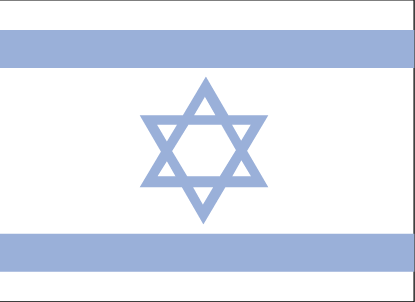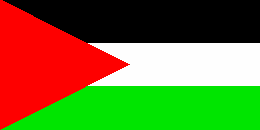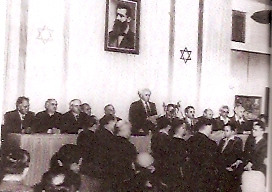|
View of Zionism
"Zionism as a political movement ws the revolt of an oppressed nation
against the depredation and wicked discrimination and oppression of the
countries in which anti-Semitism flourished." (Herzog, 347)
Self-Determination
"The
re-establishment of Jewish independence in Israel, after centuries of
struggle to overcome foreign conquest and exile, is a vindication of
the fundamental concepts of the equality fof nations and of
self-determination." (Herzog, 347)
|
"Surely
not for nothing has the hand of God led this people for four thousand
years through the pangs of hell and now brought back unto its land for
the third time" (Bialik, 206).
Syria/Palestine/Israel
The British falsely promised Syrian independence after World
War I and the Brits never delivered. There were too many colonial interests at
stake, such as the control of the oil fields, that the cries for justice and
freedom were made null and void. Britain
took the southern part of Syria,
also known as Palestine
and brought it under colonial rule. The British denied their promises to the
Syrians and, in turn, promised a Zionist homeland for the return of the Jewish
people to Jerusalem.
Syria adamantly opposed
Zionist influx into Palestine as it would only
cause further political, social, and economic problems in the Middle
East. In the resolution of the General Syrian Congress of Damascus
on July 2, 1919, it states pertaining to Zionism, “We oppose the pretensions of
the Zionists to create a Jewish commonwealth in the southern part of Syria,
known as Palestine, and oppose Zionist migration to any part of our country…”(“General
Syrian Congress of Damascus Resolution of July, 2 1919”). Syria desired to model its political system after
a western democratic constitutional monarchy and built its economic infrastructure
with Great Britain’s
support. Tensions and opposition to Zionism for fear of undesirable economic
conditions put tension on British-Syrian relations and Syrians lost hope for
economic development with the European because of empty claims and false
promises.
The British
imperial effect of false promises in the pursuit and exploitation of national
resource interests has birthed the modern-day Arab-Israeli conflict. There are
very strong arguments put forth on both sides which indicate extremely strong
beliefs and feelings of passionate patriotism. The ancient question of who
holds claim and belongs on the land of Palestine/Israel is one that may not be
answered until the end of time. Nowadays, with rockets flying into Israel,
bombings of Islamic fundamentalists and Jewish zealots alike, and halted peace
negotiation after halted peace negotiation one can only begin to speculate on
the perplexities involved in satisfying both parties’ wants and needs. Each
side has their own economic problems, political objectives, and
social/religious convictions. It may very well be that the only thing that can bring an end to
the Arab-Israeli conflict is Divine Intervention from God himself.
|
View of Zionism
"Zionism
is a political movement that is organically linked with world
imperialism ad is opposed to all liberation movements or movements for
progress in the world. The Zionist movement is essentially fanatical
and racialist; its objectives involve aggression, expansion and the
establishment of colonial settlements..." (The Palestinian National
Charter, 345).
Self-Determination
"The partition of Palestine, which took place in 1947, and the
establishment of Israel, are fundamentally invalid, however long they
last, for they contravene the will of the people of Palestine and their
natural right to their homeland and contradict ehe principles of the
United Nations Charter, foremost among which is the right of
sel-determination." (The Palestinian National Charter, 344)
|


